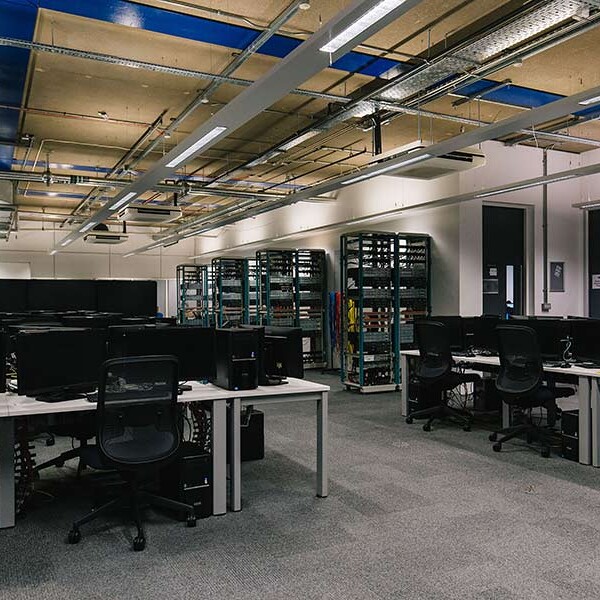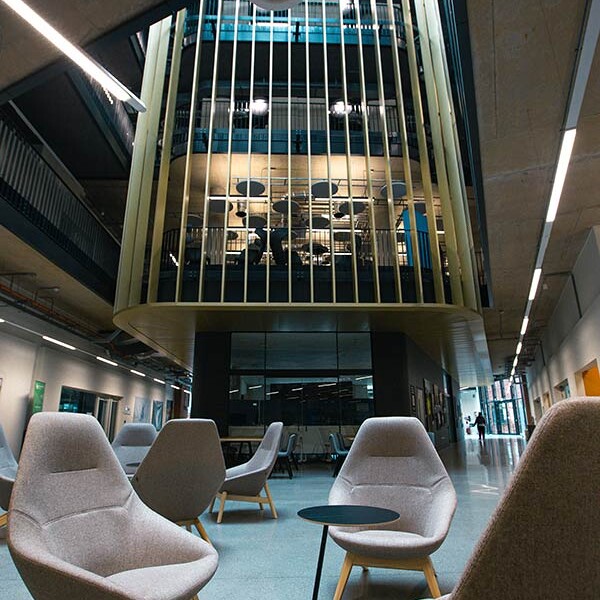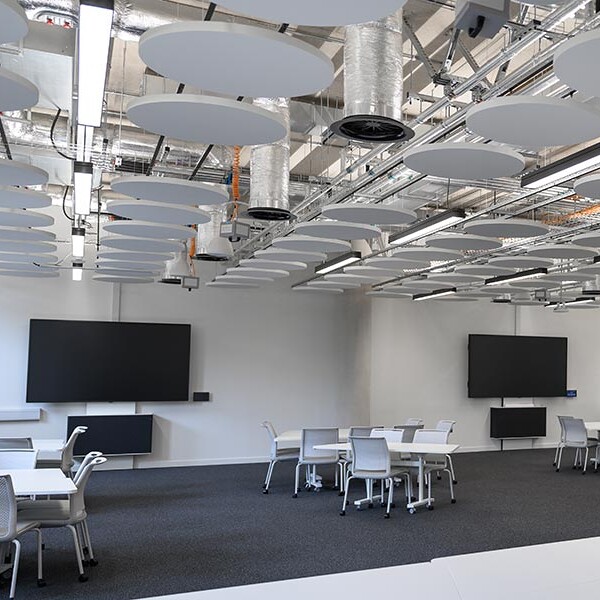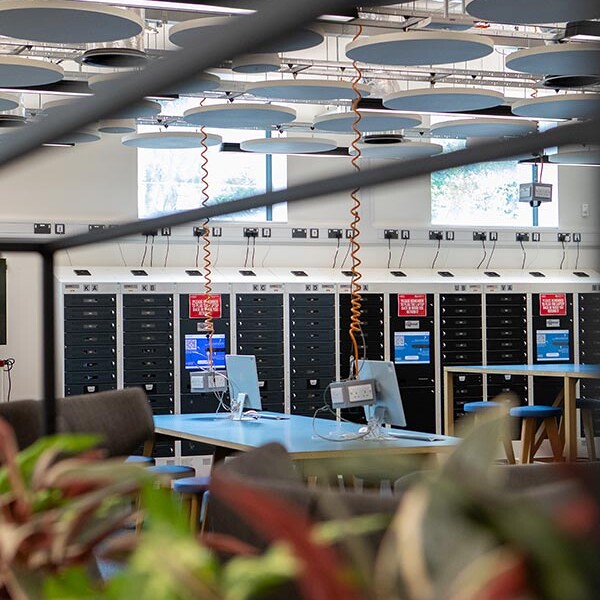
Computer Science with Artificial Intelligence - BSc (Hons)
Currently viewing course to start in 2025/26 Entry.
Developing computing skills in artificial intelligence tops the list of grand challenges facing British industry, which features in the government’s industrial strategy....
- Level Undergraduate
- Study mode Full Time
- Award BSc (Hons)
- Start date September 2025
- Fees View course fees
- Subject
- Location City Centre
This course is:
Available with Professional Placement year
Open to International Students
Overview
I'm a third year Music Technology student. When I was looking for Music Technology courses, Birmingham City University really stood out to me. I was keen on attending a Bachelor of Science and the course really focussed on the science aspects as well as maintaining the artistic elements of music and sound production. The support of the tutors has been fantastic. The professional standard and the facilities on campus are great due to their accessibility around the clock. The easy access to studios has been extremely helpful in completing my work and keeping on top of deadlines. At BCU, there's been a heavy focus on employability and what I could do with all aspects of my degree. The university has organised the industrial mentor forum, a space where students can communicate with alumni and people within the industry. The Acoustics Special Interest Group also consisted of more bespoke talks from people within the acoustics industry about different aspects of the work and how individual companies run. This is how I developed contact with an acoustic consultancy to complete my placement year. I act as an Acoustic Technician at Dragonfly Consulting. It went so well that I'm returning upon my graduation to continue working with them. The university has given me opportunities I don't think I would have received anywhere else.
I'm a second year computer science student studying at Birmingham City University. As a Computing student, there are plenty of computer labs available. There's entire rooms filled with Cisco networking equipment, as well as laptops that can be rented out to complete your work. Several of the facilities have now moved over to STEAMhouse, which is a £70 million build that is now the new home for Computing and Digital Technology students. One of the main things for me was getting employment at the end of my university degree. And Birmingham City University offers a wealth support for moving into the work environment. The course is a very important focus and a very industry focussed as well. I've been offered roles as a student demonstrator for Python programming. I found that the best way to show that you've understood something is to be able to teach somebody else.
I'm studying Computer Networks and Security. So far, I've really enjoyed my time at BCU. I felt really included within the student community. For the past two years, I've been involved in Innovation Fest. This is an annual event that showcases student work from the faculty. A lot of employers visit this festival, which allows us to widen our professional network. Throughout my time at BCU, I've had some time to
develop a relationship with the Careers+ team and go through tailoring my CV and my cover letters with them. Because of this, I have been presented with many opportunities which they have tailored to me and my needs. Through this, I was encouraged to apply for the women in tech competition.
So it was a one week program and I was working with the team from Cyferd. It's a software company,
and I successfully won and have taken up the placement year with them as a Junior Development Lead.
I look forward to coming back and applying the skills I've learnt throughout my placement and applied them within my studies.
Developing computing skills in artificial intelligence tops the list of grand challenges facing British industry, which features in the government’s industrial strategy. The BSc (Hons) Computer Science with Artificial Intelligence course is aimed to produce computer scientists for roles such as computer programmer, software developer, website designer, and artificial intelligence and machine learning engineer. Skilled in cyber security, cloud computing, deep learning, natural language processing and computer vision, graduates deliver high-value software solutions for modern economy.

Introducing STEAMhouse
STEAMhouse is a centre for technology, innovation, creative thinking, prototyping and business development. Our £70 million pound building is the home for all of our Computing courses.
What's covered in this course?
Throughout the course, you will have opportunities to interact with a curriculum that is supported by commercial and industrial content and partners.
In your first year, you will share five out of six modules with the BSc (Hons) Computer Science course. The first year covers fundamental concepts, such as computer programming, algorithms and data structures, computer systems, website development and introductory artificial intelligence, and nurtures your creativity with an innovation project.
In the second year, you will consolidate your learning with four computer science modules and two artificial intelligence specific modules. The computer science modules teach advanced topics, including cyber security and software design, as well as core topics, such as object-oriented programming and database and web application development. The other two modules teach artificial intelligence and machine learning and deploying software with machine learning operations.
In the final year, you will study cutting-edge techniques in modern computing, including deep neural networks, modern data stores, cloud computing and natural language processing. In addition, you will complete an individual project to demonstrate your technical skills and general employability in preparation for your career. The individual project simulates typical graduate workplace tasks that require in-depth knowledge and skills in a specific area of computer science and artificial intelligence. This will include a consideration of wider issues and the ability to manage activities and resources, and to generate, implement and report on solutions to meet objectives.
During your course, you will have the opportunity to take a professional placement year between your second and third year, which we highly recommend, as it will give you an invaluable opportunity to hone your expertise, try out a potential career path and get relevant workplace experience that is valued by many employers, boosting your CV.
Professional Placement Year
This course offers an optional professional placement year. This allows you to spend a whole year with an employer, following successful completion of your second year, and is a great way to find out more about your chosen career. Some students even return to the same employers after completing their studies.
If you choose to pursue a placement year, you will need to find a suitable placement to complement your chosen area of study. You will be able to draw on the University’s extensive network of local, regional, and national employers, and the support of our Careers teams. If you are able to secure a placement, you can request to be transferred to the placement version of the course.
Please note that fees are payable during your placement year, equivalent to 20% of the total full-time course fee for that year.
Machine Learning Operations taught at BCU is a truly amazing subject as it got the students to develop “real world” examples; it has sparked my interest to continue further studies here.
Zan Zver
Why Choose Us?
- Brand new facilities at STEAMhouse - This state-of-the-art building based at our expanding City Centre Campus gives you access to outstanding facilities and teaching spaces, as well as opportunities to collaborate with people and businesses across multiple sectors and work on real industry-based projects.
- Learn from industry experts - Our staff have a wide range of research and industrial experience. They are also actively involved in a range of professional associations such as the British Computer Society and the Higher Education Academy.
- Strong industry links - With companies such as Oracle, Linux Professional Institute, Microsoft and Apple. This allows us to ensure that the course is up to date, relevant and respected by employers.
- Student satisfaction - Top 20 in the UK for student satisfaction for Computer Science (Complete University Guide 2025).
- Optional professional placement year - You will have the opportunity to undertake professional placement in between your second and final year of study
- Practice based - With emphasis on computer lab-based practical work and project delivery, this course will provide you with many opportunities to acquire both the technical and transferable skills desired by industry.
- Employability driven - We focus on employability so our course encourages and enables collaborative activity, engagement with work placements, projects and international exchanges. Various activities have been built into the course to promote employability such as innovation fest, mid-semester employability week and the mini project during level 4 induction week.
Open Days
Join us for an Open Day where you'll be able to learn about this course in detail, chat to students, explore our campus and tour accommodation. Booking isn't open for this event yet, register your interest and we'll let you know as soon as booking goes live.
Next Open Day: 28 June 2025
Entry Requirements
These entry requirements apply for entry in 2025/26.
All required qualifications/grades must have been achieved and evidenced at the earliest opportunity after accepting an offer to help confirm admission and allow for on-time enrolment. This can also include other requirements, like a fee status form and relevant documents. Applicants can track their application and outstanding information requests through their BCU mySRS account.
Essential requirements
- Standard offer: 112 UCAS Tariff points. Learn more about UCAS Tariff points.
- Accelerate offer: 80 UCAS Tariff points. Find out more about BCU Accelerate.
If you have a qualification that is not listed, please contact us.
Fees & How to Apply
UK students
Annual and modular tuition fees shown are applicable to the first year of study. The University reserves the right to increase fees for subsequent years of study in line with increases in inflation (capped at 5%) or to reflect changes in Government funding policies or changes agreed by Parliament. View fees for continuing students.
Award: BSc (Hons)
Starting: Sep 2025
- Mode
- Duration
- Fees
- Full Time
- 3 years
- £9,535 in 2025/26 ✱ Important note for this price
- Apply via UCAS
(↩Back to price) * The Government is proposing to increase the cap on full-time regulated tuition fees to £9,535 for 2025/26 and the University is planning on increasing fees to that maximum level once legislation is enacted. Part-time fees are charged pro-rata, where applicable.
International students
Annual and modular tuition fees shown are applicable to the first year of study. The University reserves the right to increase fees for subsequent years of study in line with increases in inflation (capped at 5%) or to reflect changes in Government funding policies or changes agreed by Parliament. View fees for continuing students.
Award: BSc (Hons)
Starting: Sep 2025
- Mode
- Duration
- Fees
- Full Time
- 3 years
- £17,690 in 2025/26
Guidance for UK students
UK students applying for most undergraduate degree courses in the UK will need to apply through UCAS.
The Universities and Colleges Admissions Service (UCAS) is a UK organisation responsible for managing applications to university and college.
Applying through UCAS
- Register with UCAS
- Login to UCAS and complete your details
- Select your course and write a personal statement
- Get a reference
- Pay your application fee and submit your application
Guidance for International students
There are three ways to apply:
1) Direct to the University
You will need to complete our International Application Form and Equal Opportunities Form, and submit them together with scan copies of your original academic transcripts and certificates.
2) Through a country representative
Our in-country representatives can help you make your application and apply for a visa. They can also offer advice on travel, living in the UK and studying abroad.
3) Through UCAS
If you are applying for an undergraduate degree or a Higher National Diploma (HND), you can apply through the UK’s Universities and Colleges Admissions Service (UCAS).
You can request a printed form from your school or nearest British Council office. You will be charged for applying through UCAS. Birmingham City University’s UCAS code is B25 BCITY.
Personal statement
UK / EU students are required to submit a personal statement as part of their application for this course.*
The personal statement gives you a crucial opportunity to say why you’re applying and why the institution should accept you.
Here are the key areas you’ll need to address:
- Course choice - Why does this course appeal? What areas are of particular interest?
- Career plans - If you have a specific career in mind, say how your chosen course will help you pursue this goal.
- Work experience - Mention any work that is relevant to your subject, highlighting the skills and experience gained.
- School or college experience - Highlight skills gained at school/college, eg summer schools or mentoring activities.
- Non-accredited skills or achievement - eg Duke of Edinburgh Award, Young Enterprise scheme.
You should also mention your future plans – if you’re planning to take a year out, don't forget to give your reasons. Talk about any subjects you’re studying that don’t have a formal assessment and any sponsorships or placements you’ve applied for. And don't be scared to add in details about your social, sports or leisure interests.
Worried about Personal Statements?
If you've got no idea where to start or just want to check you're on the right track, we’ve got expert advice and real examples from our students to help you nail your personal statement. You can even download our ultimate personal statement guide for free.
*Non-EU students are not required to submit a personal statement when applying for this course.
Course in Depth
Year one
In order to complete this course, you must successfully complete all the following CORE modules (totalling 120 credits).
Within the Computer Systems Module, you will gain knowledge and experience of computers and computer hardware.
This module presents a holistic view of how computer systems work and it also provides the underpinning knowledge required:
- for the design of computer architecture
- to show how software interacts with hardware
- to apply electronics principles
- to use number systems for computer technology
This module provides the underpinning skills necessary to develop an effective web based information system based around a clear understanding of the visual requirements of an interface, a structured design approach and the technical skills necessary to implement a solution.
Data structures and algorithms are essential in computer science, software engineering, and computer games and graphics programming. Data structures are structured representations of data; the design of a data structure determines how operations (such as reading to, writing from, modifying, or computing with the data) can be achieved. An algorithm is a set of instructions which can be followed in order to solve a computational problem.
Students will undertake a major project involving research and application of that research in the solution of systems-related problems.
Knowledge and understanding are acquired though a mixture of formal lectures, tutor-led seminars and practical activities, with other independent learning activities at all stages. Emphasis is placed on guided, self-directed and student-centred learning, aimed at increasing independence of approach, thought and process.
The module provides access to effective commercial development environments and ensures students have practical awareness of computer systems requirements. Students are required to meet strict deadlines, and to manage and plan their overall workload.
Knowledge is assessed by several methods, including seminars, coursework, viva, presentation, interactive automated assessment, formal examination, and project work. Assessment criteria are published both at a generic course level and to provide guidance for individual items of assessment. Anonymous marking systems are in place for all formal examinations.
This introductory computer programming module provides the underpinning knowledge and practice for computing students to design, build and test software components. The module will make use of practical sessions primarily to allow you to apply programming principles and constructs in order to creatively solve problems by means of developing small programs. Module content and assessment enables learners to acquire programming skills in a modern imperative language.
This module covers the basic principles of artificial intelligence systems, techniques and the types of problems that can be solved by such techniques. This module also evaluates the risks and benefits of AI adoptions in different domains. Students learn about the philosophy of AI and how knowledge is represented.
The module utilises a hands-on approach to teaching. Teaching sessions include experiential activities such as critique of example scenarios; these scenarios will include situations tailored to real world case studies.
Year two
In order to complete this course, you must successfully complete all the following CORE modules (totalling 120 credits).
Programming is an engineering tool that plays a vital role to drive most of the modern technologies surrounding us, including the technological devices for communication, transportation and entertainment. In other words it can be said that our modern lifestyles are heavily dependent on programming.
Moreover, businesses increasingly rely on computers and the software run on them. Programming skills and a broader and deeper understanding of programming are therefore becoming increasingly important to the jobs market.
The vast majority of web applications are connected to databases for the purpose of storing and retrieving information. On this module you will be introduced to relevant concepts and technologies, applying them to the development of such applications. You will gain knowledge and skills concerning data modelling (entity-relationship models) and relational database implementation and administration (using SQL).
You will also acquire new programming skills (e.g., writing server-side scripts in PHP) in order to produce applications that provide useful functionality. You will also gain practical experience in the use of web frameworks to develop web applications to enhance your employability skills.
Artificial Intelligence (AI) is a core component of computer science, aiming at developing intelligent agents that mimic human’s cognitive capability in learning, reasoning, and problem solving.
As a branch of AI, machine learning (ML) allows to create software that adapts and learns (from examples), rather than being explicitly programmed for a particular outcome. Both AI and ML rely on managing, processing and analysis of large datasets, something that Data Science (DS) is concerned with. Many services provided by technology giants such as Google, Microsoft, IBM, Facebook, Amazon, etc. are powered by DS, ML and AI. The recent advances in these subjects have already led to significant industrial applications such as self-driving cars and Industry 4.0.
Computer Scientists need to address the realities of the application of their field within an environment where cyber security threats present unique challenges to application and system developers, in relation to the requirement for secure design and operation. This module provides a foundation for security consideration as required in the design of software expected to perform within a networked and data sharing environment. This module has been designed to provide the necessary theoretical framework, foundations and practical support for effectively pursuing security solutions with reference to the requirement for secure application development.
This module is about software engineering with a focus on software design. It covers three stages of the software engineering life-cycle, requirements, design and implementation, but with a focal point on design and an emphasis on the design theme.
The module provides the necessary skills to:
- construct models of requirements and designs,
- synthesise implementations from design models,
- apply software design patterns.
The standard UML is used as the modelling language, the vehicle through which important design concepts are explored to convey a software engineering ethos based on getting it right by adequately studying the problem and mindfully constructing designs of software solutions.
This module covers the rapidly growing area of Machine Learning Operations (MLOps) and its coupling with the management and governance of data.
Data management aims to minimise the risk and cost of storing and utilising data in an efficient manner that ensures regulatory compliance, while avoiding legal complications, and security breaches. It also entails the provision of efficient access to accurate data when and, where it is needed, to facilitate effective provision of data-powered services and data-driven decision making.
Machine Learning Operations (MLOps) is the Data Science equivalent to the term “DevOps” used in Software Engineering, namely it covers appropriate practices and strategies for organisations to successfully apply Machine Learning techniques in a structured, explainable, repeatable and, importantly, production-ready manner.
Professional Placement Year (optional)
In order to qualify for the award of Bachelor of Science with Honours Computer Science with Artificial Intelligence with Professional Placement Year and Foundation Year, you must successfully complete all of the modules listed as well as the following Level 5 module:
This module is designed to provide you with the opportunity to undertake a credit bearing, 40- week Professional Placement as an integral part of your Undergraduate Degree.
The purpose of the Professional Placement is to improve your employability skills which will, through the placement experience, allow you to evidence your professional skills, attitudes and behaviours at the point of entry to the postgraduate job market. Furthermore, by completing the Professional Placement, you will be able to develop and enhance your understanding of the professional work environment, relevant to your chosen field of study, and reflect critically on your own professional skills development within the workplace.
Year three
In order to complete this course, you must successfully complete all the following CORE modules (totalling 120 credits).
Deep learning (also called deep neural network) is a sub-field of Artificial Intelligence (AI), aiming at extracting knowledge automatically from large data sets in a hierarchical way.
Deep learning, which is considered as the state-of-the-art in data science and AI, is inspired by the structure of human brain. Now well established and accepted in industry, deep learning provides both predictive and descriptive analytics solutions that can be applied to a wide range of applications from business to scientific and governmental applications.
As artificial intelligence gets widely adopted, its societal implications correspondingly deepen and broaden. Therefore, this module teaches the ethical implications of using artificial intelligence and will invite a critical assessment of such implications in the assessed work.
This module will introduce NoSQL databases and distributed data storage frameworks through practice based activities. Through guided hands-on tutorials, you will become familiar with techniques using non-structured and semi-structured data examples. Also, you will gain knowledge on managing and processing data in a distributed infrastructure. This module will improve your development skills and provide experience with many different data systems. Also, students will gain knowledge about protection of the data in NoSQL systems.
Natural Language Processing (NLP) is a rapidly developing field with broad applicability throughout the hard sciences, social sciences, and the humanities. The ability to harness, employ and analyse linguistic and textual data effectively is a highly desirable skill for academic work, in government, and throughout the private sector.
This module is intended as a theoretical and methodological introduction to the most widely used and effective current techniques, strategies, and toolkits for natural language processing.
The module will also consider how harnessing large digital corpora and large-scale textual data sources has changed how scholars engage with and evaluate digital archives and textual sources, and what opportunities textual repositories offer for computational approaches to the study of literature, history, and a variety of other fields, including law, healthcare, business, and the social sciences.
One of the major objectives of the computer science course is to introduce the theory, principles and technologies underlying the construction of modern computing systems. This module introduces Cloud Computing, which is the technology that enables on-demand computing resources (everything from applications to data centres) over the Internet.
This technology has revolutionised modern computing by allowing users to access infinite pool of computing services and resources on a pay-per-use basis. This module introduces the fundamental concepts and technologies related to cloud computing architecture, platforms and services. The module follows a practical approach to equip the students with hands-on experience of cloud computing by using a public Cloud service, such as Amazon Web Services.
The purpose of the module is to enable you to undertake a sustained, in-depth and research-informed project exploring an area that is of personal interest to you. In agreement with your supervisor, you will decide upon your topic which will take the form of a practical outcome (artefact) with accompanying contextual material. The main consideration when choosing your topic is that it must be aligned to the programme you are studying, and you should consider the relevance of this topic to your future academic or professional development.
At this level, you will be expected to work independently but you will receive additional one-to-one support from your supervisor, who will be familiar with your chosen topic area. As you progress on the module, extra support will be available and this may take the form of group seminars, workshops and online materials that will help to develop your project.
Knowledge and understanding are acquired though a mixture of formal lectures, tutor-led seminars and practical activities, with other independent learning activities at all stages.
Emphasis is placed on guided, self-directed and student-centred learning, aimed at giving you increasing independence of approach, thought and process.
The course provides access to effective commercial development environments and ensures you have practical awareness of computer systems requirements. You are required to meet strict deadlines, and to manage and plan your overall workload.
Knowledge is assessed by a number of methods, including seminars, coursework, viva, presentation, interactive automated assessment, formal examination and project work. Assessment criteria are published both at a generic course level and to provide guidance for individual items of assessment. Anonymous marking systems are in place for all formal examinations.
You will undertake a major project involving research and application of that research in the solution of systems-related problems.
Download course specification
Download nowBSc Computer Science with Artificial Intelligence embodies the academic and industrial understanding that artificial intelligence is a highly demanded specialisation of computer science, and therefore practitioners of artificial intelligence must have a strong and solid foundation in computer science.
Level Four
The first year equips you with a solid foundation in key topics in Computer Science and introduces artificial intelligence. Therefore, the first year shares five of its six modules with BSc (Hons) Computer Science and covers key concepts, such as computer programming, algorithms and data structures, computer systems, website development and introductory artificial intelligence, and nurtures your creativity with an innovation project. Your practice is supported by presentations, seminar discussions of key topics and ideas, and collaborative practices with other students. After the first year, you will have covered a broad range of topics in Computer Science that will upskill you to understand the key industrial skills and prepare you to take advanced topics in the subsequent years.
Level Five
The second year consolidates your learning with four computer science modules and two artificial intelligence specific modules. The computer science curriculum includes highly sought-after skills in cyber security, software design, object-oriented programming, databases, and web application development. The topics on artificial intelligence are machine learning, and machine learning operations.
These topics are highly practical and underpin the roles of Software Developers, Computer Programmers and Machine Learning Engineers in industry.
Level Six
The final year covers the advanced topics in practice of artificial intelligence and covers the key application areas. These include Deep Learning, the technology behind the mass adoption of artificial intelligence in industry and its applications in computer vision and natural language processing. This year also teaches key enabling technology powering scalable computing in industry.
Your learning culminates into an Individual Honours Project where you display your learning by developing a well-rounded, professionally developed, artificial intelligence driven software solution for a problem of modern relevance.
The final year readies you for a graduate level job in the computing, artificial intelligence, and data science industry.
Employability
Enhancing your employability skills
You will learn of range of skills which will be key to enhancing your future employability.
Specifically, you will learn to:
- Develop software solutions to real world problems.
- Use a range of modern techniques to engineer software products.
- Understand the role, and techniques and application of artificial intelligence in the modern software systems and their societal impact.
- Implement the deployment pipeline of artificial intelligence and machine learning based software system.
- Work independently and collaboratively.
- Be a self-motivated, organised, effective learner.
- Communicate your work effectively via both oral and written communication skills.
Professional practice guidance will teach you a range of skills such as writing CVs and job applications, and preparing for interviews; the use of social media and other platforms for self-promotion, presenting yourself and your work in a professional framework using a range of appropriate communication skills, such various types of presentation software will also be practised.
Graduate Jobs
The job opportunities for the graduates of BSc Computer Science with Artificial Intelligence are immensely broad because they can work both in roles concerning software development as well as artificial intelligence and data science.
The graduates can apply for job roles such as:
- Software Developer
- Software Engineer
- Web Developer
- Computer Programmer
- Java Developer
- Python Programmer
- Computer Scientist
- Machine Learning Engineer
- Machine Learning Scientist
- Artificial Intelligence Engineer
- Artificial Intelligence Developer
- Data Scientist
- Data Engineer
- Backend Developer
- Analyst
- Machine Learning Operations Engineer
Further Study
You can progress onto a range of postgraduate studies, including (but not limited to) an MSc in disciplines concerning Computer Science, Artificial Intelligence, Data Science, Software Engineering, and Computer Games. You could also potentially go straight to doctoral research study.
MSc Big Data Analytics and MSc Artificial Intelligence are popular choices for applicants with background or interest in the above-mentioned disciplines.
Placements
You will have the opportunity to take a placement year between your second and third year. This is something that is highly recommended, as it will give you an invaluable opportunity to put your skills into practice, try out a potential career path and get relevant workplace experience that is valued by so many employers.
Industry Links
While studying your Computer Science with Artificial Intelligence degree with us, you’ll also have access to dedicated industry-standard facilities in a fully equipped lab running the latest software. Plus, we’re home to a Cisco Systems and a Microsoft Academy Centre, so you can rest assured knowing our university course will prepare you for a successful career in the industry.
International
Birmingham City University is a vibrant and multicultural university in the heart of a modern and diverse city. We welcome many international students every year – there are currently students from more than 80 countries among our student community.
The University is conveniently placed, with Birmingham International Airport nearby and first-rate transport connections to London and the rest of the UK.
Our international pages contain a wealth of information for international students who are considering applying to study here, including:
- Details of the entry requirements for our courses
- Some of the good reasons why you should study here
- How to improve your language skills before starting your studies
- Information relevant to applicants from your country
- Where to find financial support for your studies.
Facilities & Staff
Our Facilities
We are constantly investing in our estate and are currently in the process of spending £260 million on new learning facilities. This course will be taught at Millennium Point at the City Centre Campus.
The course is supported with a wide range of cutting-edge facilities in the City Centre Campus. We have a state-of-the-art computer games technology lab which contains high-performance PCs, Sony PlayStation development kits and a range of industry standard software including Unity, Unreal and a suite of professional Microsoft development tools.
We also have many open access areas where students can study together and even hire out laptops for use in these spaces and others within the university.
Within the University there are many internationally recognised research teams giving you the opportunity to collaborate with them on exciting interdisciplinary projects.
Computer networking
The laboratories are well-equipped for all our computer networking courses, as well as specialist areas for practical work such as voice-over internet protocol (VoIP), forensic and ethical hacking technologies, wireless and mobile technologies and radio frequency identification technologies to name but a few.
Software development and computer programming
There are a number of open access, software development and computer programming laboratories that can be used to develop systems and programmes, including database management systems such as MySQL, to name but a few.
Systems laboratories
Our embedded systems laboratories are used to develop real-time systems, such as specialist hardware training and development resources, and industrial-standard software development and simulation tools. These include microcontroller software and robotics design and development, to name but a few.
Electronic systems
To underpin the basic principles of electronic systems, we have a well-equipped laboratory of general and specialist test and measurement kits, including powered prototyping development boards, dual power supplies, frequency generators and counters and digital multi-meters to name but a few.
Forensic computing
Our successful development of forensic computing has led to a specialist forensics laboratory that is fully equipped with essential hardware and software for this sensitive area of study. The laboratory includes high-spec PCs with built-in multi interface Tableau write blockers, EnCase and FTK computer forensic software and steganography detection and analysis software, to name but a few.
Our staff
Dr Quanbin Sun
Senior Lecturer
Dr. Quanbin Sun is the director of undergraduate study in the department of computer and data science (CDS). He is the year lead of Level 6 and would like to hear all your voices. He also looks after the final year project (CMP6200) and leads the L4 common module (Computer Programming). He is currently an active researcher in the Intelligent...
More about QuanbinKira Summers
Programme Leader, Lecturer
Akira Summers has been working in software and technological development since the year 2000. Starting off in web development and interactive media, she has held many development roles and spent several years working as an embedded game programmer, multimedia developer and learning technologist.
More about KiraDr Iain Rice
Senior Lecturer
Dr Rice is a specialist in Machine Learning and Signal Processing with several years of experience applying AI models to a wide range of real-world problems. As the head data scientist for The RAPID Project Iain created algorithms allowing for up to 12 hours advanced prediction of cardiac arrest in children.
More about IainDr Mariam Adedoyin-Olowe
Programme Leader – MSc Artificial Intelligence
Mariam is Programme Leader of MSc Artificial Intelligence at Birmingham City University. She is also a researcher in the field of Data Mining/Data Analytics/Data Science. She obtained her PhD degree in Computing Science from the School of Computing Science and Digital Media (IDEAS Research Institute) of Robert Gordon University (RGU), United...
More about MariamDr Abdel Rahman H. Tawil
Professor in Software Engineering
Abdel-Rahman H. Tawil is currently a Professor in Computing and Digital Technology. He received his BSc in Computer Science from the University of Jordan in Amman and his PhD is in the area of Semantic Interoperability in Heterogeneous and Distributed Multiple-Information Servers Environment from Cardiff University, Cardiff, UK. Before he...
More about Abdel RahmanJay Patel
Senior Lecturer
Jay has been involved with the delivery of ERDF projects. Since the successful completion of these projects he has moved into teaching. He currently delivers a variety of modules such as Audio Visual Technology, Moving Image Technology and Mathematics for Media.
More about JayDr Antonio Nehme
Lecturer in Computer Science
Antonio Nehme holds a BSc in Computer Science with a minor in Mathematics from the Lebanese American University and a PhD in Cyber Security from Birmingham City University. His research focuses on identity management and access control, security of microservices-based applications, auditing and secure collaborations in distributed systems,...
More about AntonioDr Sara Hassan
Senior Lecturer in Software Engineering
Sara is a full-time Senior Lecturer in software engineering. She received her PhD in Computer Science in 2019 from University of Birmingham, UK. She worked as a teaching assistant for Software Engineering 2015-2019 at the University of Birmingham, UK. Prior to that she got her MEng in Computer Science with Software Engineering from...
More about SaraDr Mohammed Abdelsamea
Senior Lecturer in Information and Data Science
Mohammed is a Senior Lecturer in Data and Information Science at Birmingham City University. He has been working on developing artificial intelligence tools for healthcare and life science applications since 2005.
More about MohammedDr Ogerta Elezaj
Lecturer of Computing and Digital Technology
For the past six years, Ogerta Elezaj has been a Senior Lecturer in the University of Tirana, teaching different courses such as Big Data, Artificial Intelligence, and Data Mining. She was recipient of Alain Bensoussan postdoctoral fellowship from European Research Consortium for Informatics and Mathematics in 2019-2020 and held ERCIM postdoc...
More about OgertaDr Khaled Mahbub
Associate Professor in Software Engineering
Khaled started his academic career, in September 1999, as a Lecturer (US hierarchy) in Computer Science & Engineering at the Department of Computer Science and Engineering, Ahsanullah University of Science and Technology, Dhaka, Bangladesh, where he worked until March 2001.
More about Khaled









